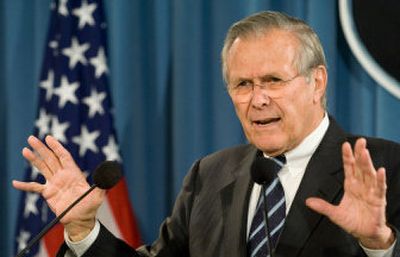Rumsfeld is focal point for Iraq war criticism

WASHINGTON – With just days to go before a critical midterm election, Democratic candidates and even a few Republicans are working hard to make the hottest election issue, the war in Iraq, more personal. The real problem, they argue, isn’t the war, but its architect: Defense Secretary Donald Rumsfeld.
As head of the Pentagon, they argue, Rumsfeld has mismanaged the fight in Iraq. And his sustained presence within the Bush administration’s war cabinet has made things worse, not better, they say.
“The really big issue here is Iraq,” said Charlie Black, a Republican political consultant. “A large segment of the American people are frustrated about Iraq and impatient about it. That’s definitely hurting the Republicans politically. It’s probably 80 percent of all our problems.”
“What you do is if an issue is working against your opponent, you use every device you can to keep bringing it up,” he said.
Rumsfeld has become such a device. But criticism of him doesn’t seem to register with President Bush, who said Wednesday that he fully expects to keep Rumsfeld through 2008, when Bush’s second term ends. Rumsfeld and Vice President Dick Cheney, Bush said, are “both are doing fantastic jobs.”
In more than 40 years of public life, Rumsfeld has often been a polarizing figure. Known as a skilled bureaucratic tactician, he has won battles and had his way in jobs in Congress, with several White House occupants, at the Department of Defense (twice), on government-sponsored commissions and within his own Republican Party.
But never has Rumsfeld faced more public scrutiny than right now, as the war in Iraq trudges on, violence and civilian casualties escalate there, U.S. combat deaths mount and candidates cast about for someone to blame or praise.
Rumsfeld obliges both sides. He is perhaps the administration’s most effective advocate on Iraq. But he appeared aloof last week when he told a group of veteran Pentagon reporters asking about Iraq to “relax, understand that it’s complicated, it’s difficult, that honorable people are working on these things.”
That “relax” comment drew sneers from Democrats intent on making Iraq a campaign centerpiece. They included Sen. Hillary Rodham Clinton, D-N.Y., Sen. Bob Menendez, D-N.J., and Rep. Rahm Emanuel, D-Ill. Each has said Rumsfeld should go.
Rumsfeld still has his champions. House Majority Leader John Boehner, R-Ohio, said Rumsfeld was “the best thing to happen to the Pentagon in 25 years.”
Rumsfeld has previously weathered resignation talk over the prisoner abuse scandal in Iraq in 2004, and from a chorus of retired generals who complained earlier this year that he was incompetent. He has twice offered his resignation, and Bush has twice refused it.
One of those retired generals, John Batiste, said that he still believes that Rumsfeld must go.
“We’ve got a failed nation state in Iraq, and there must be accountability,” said Batiste, who led the 1st Infantry Division in Iraq in 2004 and 2005 and who says he is a Republican. “And the first step is a change at the top of the Department of Defense.”